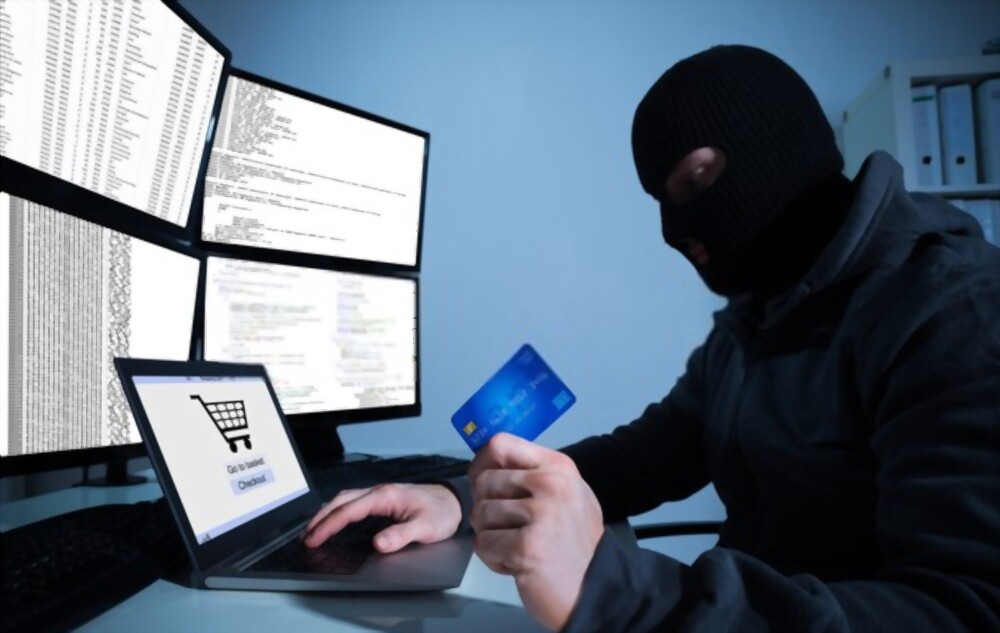In today’s digital age, shopping online has become a convenient and efficient way to purchase goods and services. However, with the increased use of online transactions in Uganda, there comes a risk of credit card fraud and identity theft. As a result, protecting your credit card and personal information while shopping online is crucial, especially in Uganda, where online security may not be as advanced as in other countries.
Also read; How to stay safe while shopping online in Uganda.
In this article, we will provide tips on how to keep your credit card safe while shopping online in Uganda. We will cover best practices for choosing secure websites, using strong passwords and two-factor authentication, and safeguarding your personal information. By following these guidelines, you can confidently and securely make purchases online, protecting yourself from potential credit card fraud and identity theft.
In addition to these tips, it is essential to regularly monitor your credit card statements and report any suspicious activity to your bank or credit card issuer. You can confidently and safely shop online in Uganda by staying vigilant and taking proactive measures to protect your credit card.
Also read; 9 Mistakes to avoid while shopping online in Uganda.
Tips to keep your credit card safe while shopping online in Uganda
Here is a list of tips to keep your credit card safe while shopping online in Uganda. By following these simple tips, you can protect yourself from cybercriminals and ensure that your personal and financial information remains secure.
- Enable two-factor authentication on your credit
- Set a spending limit on your credit card
- Do not save your credit card information a websites/apps
- Do not shop with your credit card over public WiFi
- Shop with your credit only on trusted sites/apps
- Beware of phishing attacks – Do not follow unknown links.
- Use security software like an antivirus
- Use a strong password
- Shop with your credit card at secure sites only.
- Type the website URL directly rather than searching store name on Google
- Use an online payment service like PayPal
- Be wary if the site is asking for too much information
Also read; How to sell online in Uganda.
Enable two-factor authentication on your credit.
Two-factor authentication (2FA) is an extra layer of security designed to protect your credit card and other personal information when you shop online. It works by requiring you to enter a one-time secret code (OTP) sent to your phone whenever a transaction is initiated on your card.
So even if your credit information lands in the hands of a malicious person, they will not be able to complete a transaction without entering this secret code. This code is generated by the 2FA system and is unique to each transaction.
Another way that the two-factor authentication feature can be used is by requiring you to use a personal smartphone that is recognized by the system, to confirm a transaction. In this case, you would need to have the device with you to approve or complete any transaction on your card, which makes it much more difficult for someone else to use your credit card without your knowledge.
Two-factor authentication is a valuable security tool that can help to keep your credit card and other personal information safe when you shop online. It is worth considering enabling this feature on your credit card and other accounts to help protect your personal and financial information from potential security threats. Ask your card issuer, which could be a bank or any other financial company, to enable this feature on your card.
Set a spending limit on your credit card
When you set a spending limit on your credit card, you are essentially setting a maximum amount that you are willing to allow the card to be charged in a given period of time. This can be useful for several reasons, including helping you stay within your budget and preventing overspending.
One of the primary benefits of setting a spending limit on your credit card is that it can help keep your credit card safe while shopping online. When you shop online, you may enter your credit card information into unfamiliar websites or make purchases from merchants you do not know. This can increase the risk of stealing and misusing your credit card information.
By setting a spending limit on your credit card, you can limit the damage that can be done in the unlikely event that your credit card information is compromised. For example, if you set a spending limit of UGX 500,000/-, even if someone were to steal your credit card information and try to make a large purchase, they would not be able to charge more than UGX 500,000/- to your credit card.
In addition to helping to protect your credit card information, setting a spending limit can also help you to stay within your budget and avoid overspending. When you know that you have set an amount you are willing to allow your credit card to be charged, you may be more mindful of your spending habits and more careful about your purchases.
Setting a spending limit on your credit card is a simple and effective way to keep your credit card safe while shopping online in Uganda and to help you stay within your budget.
Do not save your credit card information a websites/apps.
Many shopping sites and apps will allow you to save your credit card information for future use. Saving your credit card information on a shopping website or app can be convenient, as it lets you quickly complete purchases without entering your card details each time. However, there is a risk associated with this convenience. If the website or app is hacked or otherwise compromised, your credit card information could be exposed to cybercriminals.
Keep in mind that these criminals do not need your bank PIN to steal your money once they have your card information. Do not save your credit card information on any shopping platform to prevent this from happening. If possible, use the “guest checkout” option instead of creating an account.
Not saving your credit card information on a shopping website or app reduces the risk of your credit card information being stolen in the unlikely event of a data breach. Instead, you can manually enter your credit card information when you make a purchase. This may take a bit longer, but it can protect your credit card and financial information from potential threats.
Do not shop with your credit card over public WiFi.
Using your credit card over public WiFi can expose your personal and financial information to potential hackers and cybercriminals. When you connect to a public WiFi network, such as one in a school, hospital, hotel, park, bar etc., your device is potentially visible to anyone else on the same network. Any information you transmit over the network, including your credit card details, could be intercepted by someone with the right hacking tools and knowledge.
To keep your credit card safe while shopping online, it is advisable to use cellular data instead of public WiFi. When you connect to the internet using cellular data, your device communicates directly with your mobile network provider rather than through a public WiFi network. This means that potential hackers or cybercriminals are less likely to intercept your data.
If you need to use your credit card for online shopping and can only access the internet through a public WiFi network, consider using a virtual private network (VPN) to add an extra layer of security. VPNs create a secure, encrypted connection between your device and the internet, helping to protect your data from being intercepted.
Shop with your credit only on trusted sites/apps
Shopping on trusted and credible websites and apps can help keep your credit card information safe while shopping online because these websites and apps typically have robust security measures to protect your personal and financial information.
When you enter your credit card information on a website or app, it is transmitted over the internet to the merchant’s server. If the website or app has weak security measures, this transmission could be intercepted by an unauthorized party, potentially leading to credit card fraud.
On the other hand, trusted and credible shopping websites and apps generally have robust security measures in place to protect your information, such as secure sockets layer (SSL) technology, which encrypts the transmission of your credit card information. They may also have additional security measures, such as two-factor authentication, to further protect your information.
Reputable and credible online shopping websites are less likely to engage in the unethical practice of stealing customer credit card information, as they have a reputation to protect and maintain. Using only trusted and credible online shopping websites can help reduce the risk of stealing your credit card information.
Beware of phishing attacks – Do not follow unknown links.
Phishing attacks are a type of online scam in which fraudsters attempt to trick individuals into revealing sensitive personal information, such as passwords, credit card numbers, or other financial details. One way these attacks are carried out is by fraudsters creating fake websites that look exactly like legitimate ones.
For example, a fraudster might create a fake version of an online shopping website and send an email or message to a potential victim, urging them to click on a link that leads to the fake website. Once the victim lands on the fake website, they may be prompted to enter their login credentials, credit card information, or other sensitive data.
For example, the official website domain for Condala is “www.condala.com“, but a fraudster could create an exact copy of it and launch it on a fake domain, such as “www.condala.tk“. It is important to always double-check the address (URL) before inputting any sensitive information to ensure that you are on a legitimate website.
Use security software like antivirus.
Using security software is an important step you can take to protect yourself when shopping online. Antivirus software can help protect your computer from malware and other malicious software that can be used to steal your personal or financial information. Comprehensive Internet security software can offer even more protection, including features such as firewalls, spam filters, and identity protection to help secure your online activities.
Keeping your security software updated is vital, as new threats are constantly emerging. Make sure to install updates and patches as they become available, and consider setting your security software to update automatically to ensure that you have the latest protection.
In addition to protecting your desktop devices, it is also essential to protect your mobile devices when shopping online. Many people now shop on their phones and tablets, and these devices can be vulnerable to hacking and other online threats. Make sure to install security software on your mobile devices and follow best practices such as using strong passwords and enabling two-factor authentication to help protect your personal and financial information.
Use a strong password.
Choosing a strong password is an important step you can take to protect your personal and financial information when shopping online. A strong password should be complex for others to guess, but easy for you to remember. Some tips for creating a strong password include:
- Using a mix of uppercase and lowercase letters, numbers, and symbols
- Avoiding using personal information such as your name, birth date, or address
- Avoiding using common words or phrases that could be easily guessed
- Using a combination of at least eight characters
- Avoiding using the same password for multiple accounts
Using a unique and strong password for each of your online accounts can help protect your personal and financial information from being accessed by unauthorized individuals. If someone were to figure out your password, they would only have access to a single account and not be able to access all of your other accounts or personal information.
It is also a good idea to change your password regularly, especially if you suspect it may have been compromised. This can help ensure that your personal and financial information remains secure even if someone has discovered your password.
Shop with your credit card at secure sites only.
When shopping online, it is crucial to use a secure website to protect your personal and financial information. One way to do this is to ensure the website uses SSL (Secure Sockets Layer) technology. SSL is a security protocol that encrypts the data being transmitted between your computer and the website you are accessing. This encryption makes it much more difficult for hackers to intercept and steal your information.
Encryption is a process that converts your data into a code that is difficult for anyone other than the intended recipient to read. When you enter your credit card details on a secure website or app, the information is encrypted before it is transmitted over the network, making it much harder for anyone to intercept and use it without your knowledge.
To determine whether a website is using SSL, look for the “HTTPS” prefix in the URL and a lock icon in the address bar of your web browser. These are indicators that the website is secure and has an SSL certificate. However, it is essential to note that even if a website has an SSL certificate, it does not guarantee that the website is safe. It is always a good idea to do your research and use caution when shopping online.
By shopping with your credit card only at secure sites that use SSL, you can help protect your credit card information from being stolen by hackers. This is especially important when shopping online, as your credit card information is more vulnerable to being intercepted when transmitted over the internet. By using secure sites and taking other precautions, such as using unique passwords for each online account and being cautious of phishing attacks, you can help protect yourself when shopping online.
Also read; 5 Ways to Shop More Securely Online in Uganda
Type the website URL directly rather than searching store name on Google
Try to type in the website URL for the shopping site you want rather than Googling the store name. This reduces the risk of accidentally clicking on a fraudulent link, e.g., ‘Condola’ instead of ‘Condala’. By typing in the website URL directly, you can be sure that you are going to the correct website and not a fake or malicious site that may be trying to steal your personal or financial information.
Use an online payment service like PayPal.
Using an online payment service like PayPal can help keep your credit card safe while shopping online by acting as an intermediary between you and the merchant you are purchasing from. When you make a purchase using PayPal, you are not required to enter your credit card information directly on the merchant’s website. Instead, you log in to your PayPal account and authorize the payment from there. This means that the merchant cannot access your credit card information and cannot store it on their servers.
Additionally, PayPal offers several security features to protect your financial information. For example, they use encryption to protect your data as it is transmitted over the internet. They also offer two-factor authentication to help prevent unauthorized access to your account.
If you encounter any issues with a purchase made using PayPal, their Buyer Protection program can provide you with a refund in certain circumstances. This can give you added peace of mind when shopping online, knowing that you have some level of protection against fraud or other issues.
Overall, using an online payment service like PayPal can provide an extra layer of security when shopping online, helping to protect your credit card information and giving you the confidence to make purchases online with peace of mind.
Be wary if the site is asking for too much information.
Be cautious if a website requests too much personal information. During the account creation process for an online shopping site, it is common for the site to ask for basic information such as your name, phone number, email address, gender, shipping/delivery address, and payment methods. This information is typically used for future purchases and transactions. However, suppose a website asks for unnecessary information, such as your credit card number, national identification number, driver’s license, bank details, or family or spouse information. In that case, avoiding providing it and leaving the site is best.
Also read; How to spot an online shopping scam in Uganda.
What to do if your credit card information has been stolen?
If you suspect that your credit card information has been stolen or the card itself is stolen or lost, there are several steps you should take to protect yourself:
1. Contact your credit card issuer
If you suspect that your credit card has been used fraudulently, the first thing you should do is contact your credit card issuer. They will be able to cancel your current credit card and issue you a new one.
2. Change your passwords
Consider reviewing all your financial accounts and updating their passwords and PINs to something strong and unique. This can help keep your accounts secure and reduce the risk of unauthorized access.
3. Check your online shopping accounts.
Consider reviewing your online shopping accounts to ensure that your credit card information is not saved on any websites. If it is, consider deleting it to help protect your financial information.
4. Monitor your credit card statements
It is a good idea to regularly check your credit report for any unauthorized activity after your card is lost. If you see any charges that appear fraudulent or unfamiliar on your card statements, call your credit card issuer as soon as possible.
5. Consider freezing your credit.
If you are concerned about further fraudulent activity, consider freezing your credit. This will prevent anyone from opening new accounts in your name.
6. Report the fraud to the authorities
If you believe you are a victim of identity theft, you should report the fraud to the authorities. You can report the scam to the Bank of Uganda or your local police.
7. Take steps to protect yourself in the future.
To prevent your credit card information from being stolen in the future, make sure to only shop at secure websites, use unique and complex passwords for your online accounts, signup for transaction alerts, enable two-factor authentication, and be wary of phishing attacks. Regularly checking your credit report and monitoring your accounts for any suspicious activity is also a good idea.
Also read;
Conclusion
In conclusion, online shopping can be a convenient and efficient way to purchase goods and services. Still, it is crucial to take steps to protect your credit card and personal information from cyber-criminals. Using strong passwords, regularly updating your security software, and only shopping on secure websites can reduce the risk of credit card fraud and identity theft while shopping online in Uganda. Additionally, it is a good idea to monitor your credit card statements and immediately report any suspicious activity to your bank or credit card issuer. By following these simple tips, you can confidently and safely shop online while protecting your financial information.




